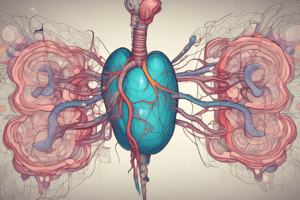Podcast
Questions and Answers
What is the most common precipitating factor for Thyroid Storm?
What is the most common precipitating factor for Thyroid Storm?
- Infection
- Stress
- Manipulation of thyroid gland during surgery (correct)
- Trauma
Which condition is NOT a classic sign of Graves' disease?
Which condition is NOT a classic sign of Graves' disease?
- Goiter
- Dermopathy
- Exophthalmos
- Hypothyroidism (correct)
What is the purpose of radioactive iodine therapy in the treatment of hyperthyroidism?
What is the purpose of radioactive iodine therapy in the treatment of hyperthyroidism?
- To increase the size of the thyroid gland
- To stimulate thyroid hormone production
- To suppress thyroid hormone production (correct)
- To treat exophthalmos
Which of these medications is NOT used in the medical management of hyperthyroidism?
Which of these medications is NOT used in the medical management of hyperthyroidism?
What is the primary type of medication used to manage extreme CV effects in Thyroid Storm?
What is the primary type of medication used to manage extreme CV effects in Thyroid Storm?
Which of the following is NOT a common cause of acquired hypothyroidism?
Which of the following is NOT a common cause of acquired hypothyroidism?
What is the primary purpose of performing a thyroid biopsy?
What is the primary purpose of performing a thyroid biopsy?
Which of the following is a characteristic of hyperthyroidism?
Which of the following is a characteristic of hyperthyroidism?
Which of the following is NOT a common cause of hyperthyroidism?
Which of the following is NOT a common cause of hyperthyroidism?
Why is thyroid-stimulating hormone (TSH) typically tested first in thyroid diagnostics?
Why is thyroid-stimulating hormone (TSH) typically tested first in thyroid diagnostics?
What is the primary mechanism by which the thyroid hormone regulation system maintains homeostasis?
What is the primary mechanism by which the thyroid hormone regulation system maintains homeostasis?
What is the primary treatment for hypothyroidism?
What is the primary treatment for hypothyroidism?
What is the most common cause of hyperthyroidism?
What is the most common cause of hyperthyroidism?
What is a goiter, and why is it rare in North America?
What is a goiter, and why is it rare in North America?
Which of the following is a characteristic of myxedema?
Which of the following is a characteristic of myxedema?
Which of the following is a possible consequence of excessive iodine intake?
Which of the following is a possible consequence of excessive iodine intake?
What is the most common cause of primary hypothyroidism?
What is the most common cause of primary hypothyroidism?
What is the medical term for excessive levels of thyroid hormone in the body?
What is the medical term for excessive levels of thyroid hormone in the body?
What is the most common manifestation of hyperthyroidism?
What is the most common manifestation of hyperthyroidism?
What is the recommended screening test for congenital hypothyroidism?
What is the recommended screening test for congenital hypothyroidism?
Flashcards
Graves Disease
Graves Disease
An autoimmune disorder causing excessive thyroid hormone release, leading to hyperthyroidism.
Hyperthyroidism Symptoms
Hyperthyroidism Symptoms
Common symptoms include goiter, exophthalmos, and dermopathy due to excessive thyroid hormone.
Thyroid Storm
Thyroid Storm
A life-threatening condition resulting from uncontrolled hyperthyroidism, marked by extreme thyrotoxicosis.
Thyroid Storm Treatment
Thyroid Storm Treatment
Signup and view all the flashcards
Diagnosis of Hyperthyroidism
Diagnosis of Hyperthyroidism
Signup and view all the flashcards
Thyroid Hormone Regulation
Thyroid Hormone Regulation
Signup and view all the flashcards
Thyroid Diagnostic Tests
Thyroid Diagnostic Tests
Signup and view all the flashcards
Hypothyroidism
Hypothyroidism
Signup and view all the flashcards
Hyperthyroidism
Hyperthyroidism
Signup and view all the flashcards
Goiter
Goiter
Signup and view all the flashcards
Acquired Hypothyroidism
Acquired Hypothyroidism
Signup and view all the flashcards
Hashimoto Thyroiditis
Hashimoto Thyroiditis
Signup and view all the flashcards
Secondary Hypothyroidism
Secondary Hypothyroidism
Signup and view all the flashcards
Myxedema
Myxedema
Signup and view all the flashcards
Synthetic Levothyroxine
Synthetic Levothyroxine
Signup and view all the flashcards
Congenital Hypothyroidism
Congenital Hypothyroidism
Signup and view all the flashcards
Cretinism
Cretinism
Signup and view all the flashcards
Metabolic Fuels
Metabolic Fuels
Signup and view all the flashcards
Study Notes
Thyroid Hormone Regulation
- The pituitary-hypothalamus axis regulates thyroid hormone production through a negative feedback mechanism.
- The hypothalamus releases TRH (thyrotropin-releasing hormone), stimulating the anterior pituitary to release TSH (thyroid-stimulating hormone).
- TSH then stimulates the thyroid gland to produce T3 and T4 hormones.
- Elevated T3 and T4 levels inhibit the release of TRH and TSH, forming a negative feedback loop.
- Various factors, including sleep, cold temperature, and stress, influence the hypothalamus, affecting thyroid hormone release.
Thyroid Diagnostic Tests
- Blood tests are crucial in diagnosing thyroid conditions
- TSH (thyroid-stimulating hormone): Measured first, as it's a sensitive indicator of thyroid function.
- T3 and T4 (triiodothyronine and thyroxine): Measure the levels of thyroid hormones directly.
- Serum-free T4: Measures the unbound, active form of T4.
- T4 resin uptake: Measures the binding capacity of thyroid-binding globulin.
- Thyroid antibodies: Detect autoimmune thyroid disorders.
- Radioactive iodine uptake: Measures the thyroid gland's ability to absorb iodine, helping diagnose conditions like hyperthyroidism.
- Fine-needle biopsy: Provides tissue samples for microscopic examination, useful for identifying tumors or nodules.
- Thyroid scan, radio scan, or scintiscan: Visualize the thyroid gland's structure and function.
Thyroid Imbalances
- Hypothyroidism: Insufficient thyroid hormone production.
- Congenital: Present at birth.
- Acquired: Develops later in life.
- Hashimoto's thyroiditis (most common cause of acquired hypothyroidism).
- Thyroidectomy (surgery to remove the thyroid).
- Hyperthyroidism (thyrotoxicosis): Excessive thyroid hormone production.
- Graves' disease (most common cause).
- Thyroid tumors.
Goiter
- Goiter is an enlargement of the thyroid gland.
- It can be associated with either over-secretion or under-secretion of thyroid hormone.
- In iodine-deficient regions, goiter is a common occurrence.
- In North America, it is less frequent due to adequate iodine levels in the diet.
Acquired Hypothyroidism
- Characterized by suboptimal thyroid function.
- Develops later in life, with women being affected five times more often than men.
- Leads to a reduction in metabolism due to decreased thyroid hormone levels.
- Severity ranges from mild to life-threatening complications.
- Causes include:
- Disease or destruction of the thyroid gland (primary hypothyroidism)
- Hashimoto's thyroiditis
- Hypothalamus or pituitary gland disorders (secondary hypothyroidism)
- Medications (e.g., lithium)
- Ingestion of large amounts of iodide
- Hyperthyroidism treatments
Hypothyroid Manifestations
- Manifestations vary from mild to severe.
- Caused by a hypometabolic (decreased metabolism) state due to thyroid hormone deficiency.
- Myxedema: A non-pitting edema (swelling) in subcutaneous tissues due to increased water retention in those tissues.
- Manifestations affect many organs and result in severe symptoms.
Hypothyroidism - Diagnostics
- Includes lab tests to measure hormone levels, such as TSH, T3, and T4.
Medical Management of Hypothyroidism
- Synthetic levothyroxine is used for thyroid hormone replacement therapy.
- Medication interactions need careful consideration, especially with hypnotic and sedative agents, and the effects on other conditions like diabetes must be monitored.
- Maintaining cardiac and respiratory function is crucial.
- Prevention of complications, like coronary artery disease (CAD), is important.
Congenital Hypothyroidism
- Occurs in about 1 in 5,000 infants.
- Results from inadequate thyroid hormone production during fetal development.
- Causes can include lack of thyroid gland, abnormal thyroid hormone synthesis, or insufficient TSH.
- Babies often appear normal at birth, but without testing, may develop problems.
- The condition can be detected early using blood tests.
- Treatment involves thyroid hormone replacement to manage the condition.
- If not treated early, complications such as intellectual disability can develop.
- Early intervention improves the prognosis, with good results if treatment begins within the first six weeks of life.
Hyperthyroidism
- "Thyrotoxicosis" occurs due to high levels of circulating thyroid hormones.
- Causes include:
- Graves' disease
- Multi-nodular goiter
- Thyroid adenoma
- Excessive thyroid hormone ingestion
Hyperthyroid Manifestations
- Hyperthyroidism is caused by increased oxygen consumption and metabolic activity due to increased sympathetic nervous system activity.
- Common symptoms include:
- Muscle wasting
- Fine hair
- Exophthalmos
- Goiter
- Sweating
- Tachycardia
- Weight loss
- Oligomenorrhea; Tremors
- The symptoms are due to increased metabolism and sympathetic activity.
Graves' Disease
- An autoimmune disorder where antibodies stimulate the thyroid gland to produce excessive amounts of thyroid hormones.
- It often results in goiter, exophthalmos, and dermopathy.
- Onset typically occurs between 20-40 years of age.
- Women are affected 5 times more often than men.
Hyperthyroidism - Diagnostics
- Lab test results for conditions like TSH, T3, and T4 to help determine a diagnosis of hyperthyroidism
Medical Management of Hyperthyroidism
- Options for treating hyperthyroidism include radioactive iodine therapy, medications (like propylthiouracil or methimazole), or surgery.
- Carefully consider medication interactions and patient-specific needs.
- Beta-blockers are used to address some of the symptoms.
Thyroid Storm (Crisis)
- A rare, extreme, and life-threatening form of thyrotoxicosis.
- Often caused by undiagnosed or undertreated hyperthyroidism.
- Precipitating factors include thyroid surgery, stress, infection, or diabetic ketoacidosis (DKA).
- Manifestations include severe symptoms like very high fever, extreme cardiovascular effects, and severe central nervous system (CNS) effects.
- Requires immediate diagnosis and treatment to address the high mortality threat.
- Supportive measures include cooling measures, fluids, glucose and electrolyte replacement, beta blockers, glucocorticosteroids, propylthiouracil, and iodine contrast.
Studying That Suits You
Use AI to generate personalized quizzes and flashcards to suit your learning preferences.




